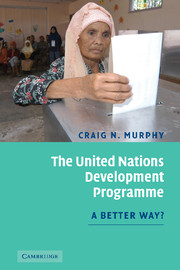Book contents
- Frontmatter
- Contents
- List of figures
- List of tables
- Foreword by Kemal Dervis
- Acknowledgements
- 1 Not the standard image
- 2 Development and the United Nations
- 3 Institutions for practical solidarity
- 4 Decolonization and economic transformation
- 5 Lewis in Ghana and after
- 6 Capacity, consensus, crisis, and consequences
- 7 Engaging liberation movements and revolutionary states
- 8 A learning organization: women, Latin America, and Africa
- 9 ‘Bottoms up’ development helps make UNDP a mammal
- 10 Working for ‘a holy man’ after the cold war
- 11 ‘Fabian socialists do not make the cut’
- 12 ‘Ploughing the sea’? UNDP and the future of global governance
- Index
11 - ‘Fabian socialists do not make the cut’
Published online by Cambridge University Press: 08 January 2010
- Frontmatter
- Contents
- List of figures
- List of tables
- Foreword by Kemal Dervis
- Acknowledgements
- 1 Not the standard image
- 2 Development and the United Nations
- 3 Institutions for practical solidarity
- 4 Decolonization and economic transformation
- 5 Lewis in Ghana and after
- 6 Capacity, consensus, crisis, and consequences
- 7 Engaging liberation movements and revolutionary states
- 8 A learning organization: women, Latin America, and Africa
- 9 ‘Bottoms up’ development helps make UNDP a mammal
- 10 Working for ‘a holy man’ after the cold war
- 11 ‘Fabian socialists do not make the cut’
- 12 ‘Ploughing the sea’? UNDP and the future of global governance
- Index
Summary
Mark Malloch Brown was a new kind of Administrator. Most strikingly, he was not from the United States.
In 1999, with the real US financial contribution to UNDP dropping (and with the United States owing more than a billion dollars in back dues to the UN proper), European governments pressed Kofi Annan to choose Speth's successor from a more reliable donor country. John Bolton, the former Reagan administration offcial, complained that Bill Clinton's refusal to demand that an American have the job showed that the Democrat was ‘spineless’ and ‘without vision’, but it had been congressional Republicans who led the effort to reduce US contributions and hold back part of its dues for more than a decade. Clinton tended to defer to them on UN-related issues, saving his political capital for what he saw as bigger battles. The New York Times even reported, ‘Washington had given up the post in hopes of further reducing its contribution to United Nations development aid.’
The Secretary-General ended up bypassing the candidates pressed on him by donor governments, and went instead for a man he had respected for two decades, a UK citizen with an advanced degree in political science from the University of Michigan and a long career in public communication. Annan and Malloch Brown had been colleagues at the Offce of the UN High Commissioner for Refugees in the 1980s.
- Type
- Chapter
- Information
- The United Nations Development ProgrammeA Better Way?, pp. 296 - 330Publisher: Cambridge University PressPrint publication year: 2006

